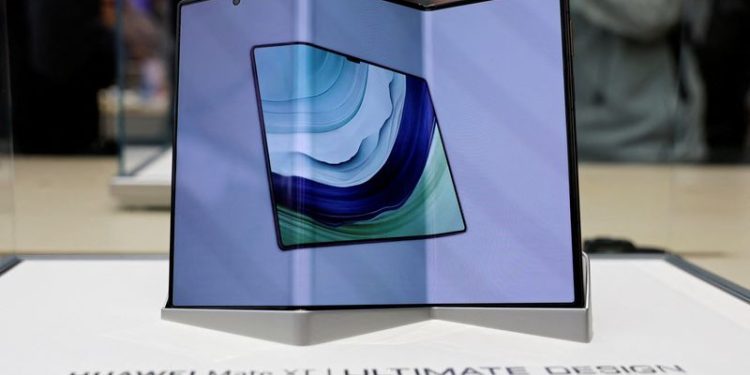BEIJING (Reuters) – Huawei’s new tri-foldable smartphone has ignited nationalistic pride in China with social media abuzz with what supporters see as its ability to out-innovate Apple (NASDAQ:AAPL) despite U.S. sanctions – even if many are balking at the phone’s $2,800 price tag.
The Chinese technology giant unveiled its Mate XT, the industry’s first tri-foldable phone, on Tuesday just hours after Apple introduced its artificial intelligence-enhanced iPhone 16 lineup.
Both the Mate XT and iPhone 16 will go on sale on Sept. 20, though the Mate XT is expected to be available only in China.
“Apple hasn’t fallen, but Huawei has truly risen again,” commented one user on Weibo (NASDAQ:WB), China’s equivalent to X.
Another wrote: “Times are changing. U.S. sanctions have been in vain.”
A video that purports to show Apple store employees in China going to a Huawei store to watch the Huawei product launch also became the No. 2 trending item on Weibo for 13 hours, garnering 91 million views and more than 6,600 comments.
The launch of the Mate XT follows Huawei’s re-emergence in the 5G premium smartphone market last year with its Mate 60 series and this year with its high-end Pura series phones that have domestically produced semiconductors.
All have been celebrated in China as a triumph over U.S. sanctions that have, since 2019, prevented the company from accessing advanced U.S. chips and other technology.
Washington sees Huawei as a national security risk – a charge that the company denies. U.S. sanctions have since broadened out to encompass export bans on highly advanced U.S. chips to all Chinese firms with Washington seeking to impede advances in technology for China’s military.
Huawei fans also noted that Apple has yet to announce an AI partner in China to power its iPhone 16 product range and Apple Intelligence, the company’s AI software, will only be available in Chinese next year.
Nationalistic pride notwithstanding, the Mate XT’s starting price of 19,999 yuan was widely criticised as beyond the reach of ordinary consumers and insensitive at a time of sluggish economic growth when ordinary citizens are struggling with financial insecurity.
Versions with more sophisticated features such as larger memory will cost as much as 23,999 yuan ($3,300).
A Weibo poll on the Mate XT showed that only 966 of some 9,200 respondents said they planned to buy it. More than 4,700 said they were put off by the price while another 3,500 said they were not considering purchasing it at the moment.
“No matter how much I like the product, the price tag just sounds crazy to me,” said a person surnamed Xu at a Beijing Huawei store, describing himself as a Huawei loyalist.
“Maybe Huawei isn’t really targeting people like me,” he added.
($1 = 7.1138 Chinese yuan renminbi)





